For this project, we will train an agent to navigate (and collect bananas!) in a large, square world.
A reward of +1 is provided for collecting a yellow banana, and a reward of -1 is provided for collecting a blue banana. Thus, the goal of your agent is to collect as many yellow bananas as possible while avoiding blue bananas.
The state space has 37 dimensions and contains the agent's velocity, along with ray-based perception of objects around agent's forward direction. Given this information, the agent has to learn how to best select actions. Four discrete actions are available, corresponding to:
0- move forward.1- move backward.2- turn left.3- turn right.
The task is episodic, and in order to solve the environment, the agent must get an average score of +13 over 100 consecutive episodes.
The environment is simulated by Unity application Banana lying in the subdirectory Banana_Windows_x86_64 We start the environment as follows:
env = UnityEnvironment(file_name="Banana_Windows_x86_64/Banana.exe")
We run several training sessions in according to the variable numb_of_trains. For each training session, the obtained weights are saved into the file 'weights_'+str(train_numb)+'.trn'. We get files: weights_0.trn, weights_1.trn, weights_2.trn, etc.
For each training session, we construct the agent with different parameters and we run the Deep-Q-Network procedure dqn as follows:
agent = Agent(state_size=37, action_size=4, seed=1, fc1_units=fc1_nodes, fc2_units=fc2_nodes)
scores, episodes = dqn(n_episodes = 2000, eps_start = epsilon_start, train_numb=i)
We experience the following parameters: fc1_units, fc2_units, eps_start. At the end of each session these parameters together with the episode number (at which the training is finished) are saved into the corresponding lists. These lists are used on the step of testing of weights. For each training session,
- eps_start is played out as a random value from 0.988 to 0.955 with step 0.001,
- fc1_units is played out as a random value from 48 to 128 with step 16,
- fc2_inits is played out as a random value from fc1_units - 16 to fc1_units - 16 with step 8.
The Deep-Q-Network procedure dqn performs the double loop. External loop (by episodes) is executed till the number of episodes reached the maximal number of episodes n_episodes = 2000 or the completion criteria is executed. The environment env is reset with the paarmeter train_mode=True. For the completion criteria, we check
np.mean(scores_window) >=13,
where scores_window is the array of the type deque realizing the shifting window of length <= 100. The element scores_window[i] contains the score achieved by the algorithm on the episode i.
In the internal loop, dqn gets the current action from the agent. By this action dqn gets state and reward from Unity environment. Then, the agent accept params state,action,reward,next_state, done to the next training step. The variable score accumulates obtained rewards.
The class Agent is defined in dqn_agent.py. This is the well-known class implementing the following mechanisms:
- Two Q-Networks (local and target) using the simple neural network.
- Replay memory (using the class ReplayBuffer)
- Epsilon-greedy mechanism
- Q-learning, i.e., using the max value for all possible actions
- Computing the loss function by MSE loss
- Minimize the loss by gradient descend mechanism using the ADAM optimizer
Both Q-Networks (local and target) are implemented by the class QNetwork lying in the file model.py. This class implements the simple neural network with 3 fully-connected layers and 2 rectified nonlinear layers. This QNetwork is realized in the framework of package PyTorch. The number of neurons of the fully-connected layers are as follows:
- Layer fc1, number of neurons: state_size x fc1_units,
- Layer fc2, number of neurons: fc1_units x fc2_units,
- Layer fc3, number of neurons: fc2_units x action_size,
where state_size = 37, action_size = 8, fc1_units and fc2_units are the input params.
This is the typical output of training sessions:
fc1_units: 96 , fc2_units: 88
train_numb: 0 eps_start: 0.99
Episode: 585, elapsed: 0:09:51.835191, Avg.Score: 13.02, score 16.0, How many scores >= 13: 58, eps.: 0.09
terminating at episode : 585 avg.reward reached +13 over 100 episodes
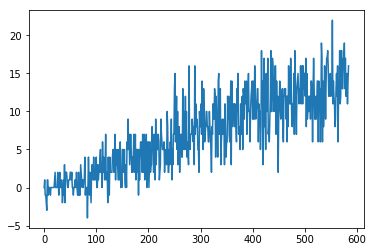
fc1_units: 48 , fc2_units: 32
train_numb: 1 eps_start: 0.992
Episode: 579, elapsed: 0:09:29.603803, Avg.Score: 13.00, score 18.0, How many scores >= 13: 51, eps.: 0.10
terminating at episode : 579 avg.reward reached +13 over 100 episodes
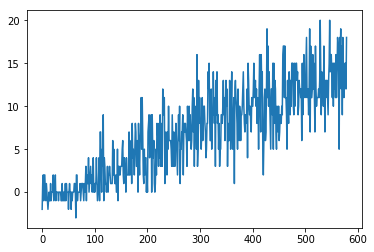
fc1_units: 80 , fc2_units: 88
train_numb: 2 eps_start: 0.992
Episode: 572, elapsed: 0:09:32.363203, Avg.Score: 13.00, score 18.0, How many scores >= 13: 65, eps.: 0.10
terminating at episode : 572 avg.reward reached +13 over 100 episodes
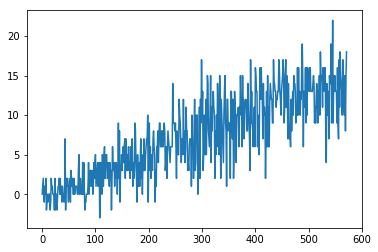
fc1_units: 64 , fc2_units: 56
train_numb: 3 eps_start: 0.994
Episode: 590, elapsed: 0:09:39.475603, Avg.Score: 13.02, score 18.0, How many scores >= 13: 57, eps.: 0.09
terminating at episode : 590 avg.reward reached +13 over 100 episodes
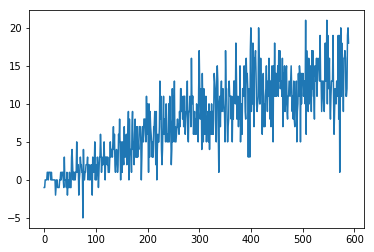
fc1_units: 80 , fc2_units: 88
train_numb: 4 eps_start: 0.989
Episode: 633, elapsed: 0:10:47.455223, Avg.Score: 13.06, score 20.0, How many scores >= 13: 58, eps.: 0.08
terminating at episode : 633 ave reward reached +13 over 100 episodes
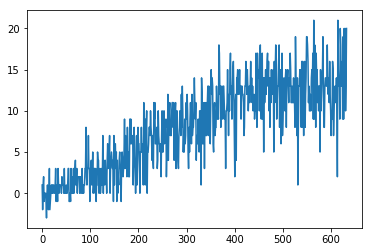
We run testing for each file weights_i.trn, where i = 0,1,2,... The testing procedure is implemented by the function checkWeights. Important: the function checkWeights constructs again the agent with the parameters fc1_units and fc2_units corresponding to the fiven weights file. The environment env is reset with the paarmeter train_mode=False.
The function checkWeights calculates the accumulated score for the episode generated by Unity environment env. For each testing session, we run checkWeights several times (=6 in this version) to get the average score for the given set of parameters.
=========================================================
Train: 0, Test: 0, Episode: 585, fc1_units: 96, fc2_units: 88, eps_start: 0.99, Score: 13.0
Train: 0, Test: 1, Episode: 585, fc1_units: 96, fc2_units: 88, eps_start: 0.99, Score: 16.0
Train: 0, Test: 2, Episode: 585, fc1_units: 96, fc2_units: 88, eps_start: 0.99, Score: 18.0
Train: 0, Test: 3, Episode: 585, fc1_units: 96, fc2_units: 88, eps_start: 0.99, Score: 14.0
Train: 0, Test: 4, Episode: 585, fc1_units: 96, fc2_units: 88, eps_start: 0.99, Score: 13.0
Train: 0, Test: 5, Episode: 585, fc1_units: 96, fc2_units: 88, eps_start: 0.99, Score: 17.0
Average Score: 15.17
=========================================================
Train: 1, Test: 0, Episode: 579, fc1_units: 48, fc2_units: 32, eps_start: 0.992, Score: 15.0
Train: 1, Test: 1, Episode: 579, fc1_units: 48, fc2_units: 32, eps_start: 0.992, Score: 9.0
Train: 1, Test: 2, Episode: 579, fc1_units: 48, fc2_units: 32, eps_start: 0.992, Score: 17.0
Train: 1, Test: 3, Episode: 579, fc1_units: 48, fc2_units: 32, eps_start: 0.992, Score: 17.0
Train: 1, Test: 4, Episode: 579, fc1_units: 48, fc2_units: 32, eps_start: 0.992, Score: 18.0
Train: 1, Test: 5, Episode: 579, fc1_units: 48, fc2_units: 32, eps_start: 0.992, Score: 17.0
Average Score: 15.5
=========================================================
Train: 2, Test: 0, Episode: 572, fc1_units: 80, fc2_units: 88, eps_start: 0.992, Score: 18.0
Train: 2, Test: 1, Episode: 572, fc1_units: 80, fc2_units: 88, eps_start: 0.992, Score: 11.0
Train: 2, Test: 2, Episode: 572, fc1_units: 80, fc2_units: 88, eps_start: 0.992, Score: 12.0
Train: 2, Test: 3, Episode: 572, fc1_units: 80, fc2_units: 88, eps_start: 0.992, Score: 10.0
Train: 2, Test: 4, Episode: 572, fc1_units: 80, fc2_units: 88, eps_start: 0.992, Score: 13.0
Train: 2, Test: 5, Episode: 572, fc1_units: 80, fc2_units: 88, eps_start: 0.992, Score: 13.0
Average Score: 12.83
=========================================================
Train: 3, Test: 0, Episode: 590, fc1_units: 64, fc2_units: 56, eps_start: 0.994, Score: 13.0
Train: 3, Test: 1, Episode: 590, fc1_units: 64, fc2_units: 56, eps_start: 0.994, Score: 20.0
Train: 3, Test: 2, Episode: 590, fc1_units: 64, fc2_units: 56, eps_start: 0.994, Score: 19.0
Train: 3, Test: 3, Episode: 590, fc1_units: 64, fc2_units: 56, eps_start: 0.994, Score: 16.0
Train: 3, Test: 4, Episode: 590, fc1_units: 64, fc2_units: 56, eps_start: 0.994, Score: 18.0
Train: 3, Test: 5, Episode: 590, fc1_units: 64, fc2_units: 56, eps_start: 0.994, Score: 14.0
Average Score: 16.67 ( the best result)
=========================================================
Train: 4, Test: 0, Episode: 633, fc1_units: 80, fc2_units: 88, eps_start: 0.989, Score: 16.0
Train: 4, Test: 1, Episode: 633, fc1_units: 80, fc2_units: 88, eps_start: 0.989, Score: 15.0
Train: 4, Test: 2, Episode: 633, fc1_units: 80, fc2_units: 88, eps_start: 0.989, Score: 16.0
Train: 4, Test: 3, Episode: 633, fc1_units: 80, fc2_units: 88, eps_start: 0.989, Score: 14.0
Train: 4, Test: 4, Episode: 633, fc1_units: 80, fc2_units: 88, eps_start: 0.989, Score: 16.0
Train: 4, Test: 5, Episode: 633, fc1_units: 80, fc2_units: 88, eps_start: 0.989, Score: 12.0
Average Score: 14.83
Most of the code is based on Udacity's DQN code.
